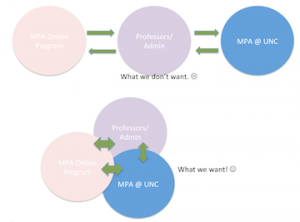A Legitimate, Professional Facebook? Actually, yes!
On Tuesday I attended a seminar that centered around the phrase “social business.” This was not a talk about social business in the sense of Muhammad Yunus, but social business as a business model which uses social media tools and social networking for conducting internal and external functions across the organization. It has the potential for adoption in a range of areas, but where I see a huge benefit is the application of social business for internal collaboration. This is exactly what NARA is aiming for: the development of an internal collaboration network (ICN). As I mentioned in my previous post, this will allow NARA employees to interact and collaborate with their colleagues from across the county in a whole new way.
As my primary project for the internship, a good portion of my week was spent exploring the ICN.
Verdict: it’s pretty awesome. Realizing this is a gross understatement, it could be described as a personalized Facebook for NARA; except with a greater element of professionalism. It has not been rolled out to the entire organization, but the pilot group currently on the ICN is transitioning well to its use. Over the summer, I’ll talk more about the ICN, (trust me- by the end of the internship my readers-all four of you-will be sick to death of hearing about it) but for the rest of this post I am going to move on to something else.
THE MPA ONLINE PROGRAM!
The discussion on Tuesday got me thinking about how the MPA program is using social business to take the program to the next level. Students in the online program will rely on many social media tools to engage, collaborate, and participate with their professors and classmates. As innovative as this may seem, this is less of a change because most of this already happens to some degree: you are reading this post via a blog, I stay connected to my classmates via Facebook, I connect with alumni through LinkedIn. The change is the shift by the MPA program to formally use these social media tools as part of their business.
As the online program takes off, I have no doubts there will be a robust collaborative exchange between students, students and professors, and students and the administration. This is precisely the same exchange that exists at the Sanders-Knapp building on campus. My concern is there will be no opportunity for interaction and exchange between students in the residential program and those in the online program. (See the incredibly illustrative figure I created. Yeah, I should copyright this thing. PowerPoint automatically creates smiley faces when you enter in the emoticon. Weird.)
What can we do to ensure there is interaction and collaboration among all students, regardless of their online or in-house presence? Should the program leave it to students to use standard social media tools, such as Facebook, to promote connections or should it take charge and create a tool specifically to meet this need? Either option has its pros and cons, but regardless of the route taken, something should be done to offer ways to communication among all students.



